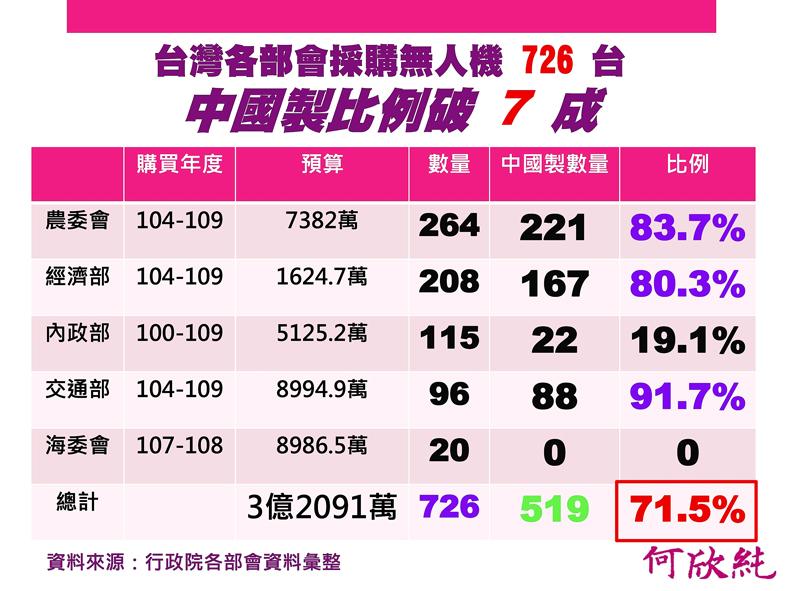Premier Su Tseng-chang (蘇貞昌) on Monday vowed to speed up the replacement of the government’s uncrewed aerial vehicles (UAVs), after legislators raised concerns that more than 70 percent were made in China.
Su was speaking during a question-and-answer session at the Legislative Yuan in Taipei, which proceeded as usual in the absence of a Chinese Nationalist Party (KMT) caucus boycott.
If “information security is national security,” as President Tsai Ing-wen (蔡英文) has said, then the Chinese-made UAVs are a matter of national security, Democratic Progressive Party Legislator Ho Hsin-chun (何欣純) said.

Photo: Hsieh Chun-lin, Taipei Times
Japan and the US have already restricted the use of UAVs made by Chinese companies, Ho said.
Japan is to replace 1,000 of its Chinese-made UAVs, as they might be sending information to China, she said, adding that it plans to swap out the UAVs it uses to find criminal suspects, build critical infrastructure and conduct topographical surveys of confidential areas.
Starting next year, when a Japanese department wants to buy new UAVs, it must consult with the Japanese Cabinet Secretariat and conduct a risk assessment, Ho added.
In the US, the government has for years issued warnings about Chinese UAVs over espionage fears, most recently considering a ban on federal agencies buying or using any foreign-made UAV.
Despite this, more than 70 percent of the 726 UAVs government agencies use are made by Chinese companies, Ho said.
The Council of Agriculture uses 221 Chinese UAVs, followed by the Ministry of Economic Affairs with 167, and the Ministry of Transportation and Communications with 88, she said.
The Ministry of the Interior and the Environmental Protection Administration use 22 and 21 Chinese UAVs respectively, Ho added.
The National Communications Commission’s Telecom Technology Center even found evidence that Chinese UAVs could pose an information security risk, she said.
During testing, the center found some abnormalities, including GPS signal interference and logs containing sensitive data, leading commission Chairman Chen Yaw-shyang (陳耀祥) to say that “some definitely raise security concerns,” Ho said.
In April last year, the Executive Yuan announced a policy restricting agencies from using any products that might imperil national security, requiring them to conduct inventories and replace any unsuitable equipment, Ho said.
However, the policy has not been implemented well, she said, adding that the inventory results have still not been released.
The Cabinet says that it is still finalizing its information security blacklist, but national security cannot wait, Ho said, asking when the list would be announced and the equipment replaced.
In response, Su vowed to implement strong protective measures, as many products from China have been linked to the Chinese military.
If there is any doubt about the security of a product, it should be gotten rid of, Su said.
Su told Vice Premier Shen Jong-chin (沈榮津) to instruct government agencies to complete their inventories and replacements in a timely manner in line with the original policy.
Apart from replacing the UAVs, Ho also called on the Cabinet to consider follow-up measures and ensure that contractors prove the absence of any security concerns.

Taiwanese can file complaints with the Tourism Administration to report travel agencies if their activities caused termination of a person’s citizenship, Mainland Affairs Council Minister Chiu Chui-cheng (邱垂正) said yesterday, after a podcaster highlighted a case in which a person’s citizenship was canceled for receiving a single-use Chinese passport to enter Russia. The council is aware of incidents in which people who signed up through Chinese travel agencies for tours of Russia were told they could obtain Russian visas and fast-track border clearance, Chiu told reporters on the sidelines of an event in Taipei. However, the travel agencies actually applied

New measures aimed at making Taiwan more attractive to foreign professionals came into effect this month, the National Development Council said yesterday. Among the changes, international students at Taiwanese universities would be able to work in Taiwan without a work permit in the two years after they graduate, explainer materials provided by the council said. In addition, foreign nationals who graduated from one of the world’s top 200 universities within the past five years can also apply for a two-year open work permit. Previously, those graduates would have needed to apply for a work permit using point-based criteria or have a Taiwanese company

The Shilin District Prosecutors’ Office yesterday indicted two Taiwanese and issued a wanted notice for Pete Liu (劉作虎), founder of Shenzhen-based smartphone manufacturer OnePlus Technology Co (萬普拉斯科技), for allegedly contravening the Act Governing Relations Between the People of the Taiwan Area and the Mainland Area (臺灣地區與大陸地區人民關係條例) by poaching 70 engineers in Taiwan. Liu allegedly traveled to Taiwan at the end of 2014 and met with a Taiwanese man surnamed Lin (林) to discuss establishing a mobile software research and development (R&D) team in Taiwan, prosecutors said. Without approval from the government, Lin, following Liu’s instructions, recruited more than 70 software

Taiwanese singer Jay Chou (周杰倫) plans to take to the courts of the Australian Open for the first time as a competitor in the high-stakes 1 Point Slam. The Australian Open yesterday afternoon announced the news on its official Instagram account, welcoming Chou — who celebrates his 47th birthday on Sunday — to the star-studded lineup of the tournament’s signature warm-up event. “From being the King of Mandarin Pop filling stadiums with his music to being Kato from The Green Hornet and now shifting focus to being a dedicated tennis player — welcome @jaychou to the 1 Point Slam and #AusOpen,” the